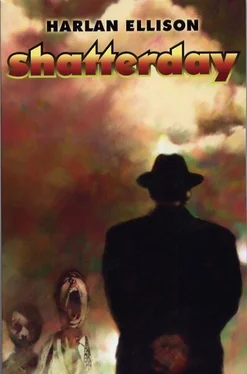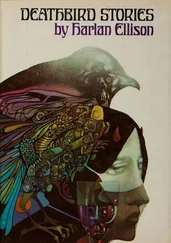But he didn’t really believe that thinking about things could make them happen. Thinking didn’t make things change in the real world. Fred Tolliver did not know about the dance of the emotions, the resonance of the electrons. He did not know about a sixty-two-year-old lightning rod that leaked off the terror and frustration of four billion people, all crying out silently just as Fred Tolliver cried out. For help that never came.
The phone continued to ring. He did not think about the pains he had felt in the back of his knees, as recently as sixteen months ago. He did not think about it, because he did not want it to return. It was only a low-level throbbing now, and he wanted it to stay that way. He didn’t want to feel pins and needles. He wanted his money back. He wanted the sound of gurgling under the floor of the guest bathroom to stop. He wanted William Weisel to make good.
He answered the phone. It rang once too often for him to ignore it.
“Hello?”
“Mr. Tolliver? Is that you?”
“Yes, this is Fred Tolliver. Who’s calling?”
“Evelyn Hand. I haven’t heard from you about my violin, and I’m going to need it late next week…”
He had forgotten. In all the anguish with Weisel, he had forgotten Evelyn Hand, and her damaged violin. And she had paid him already.
“Oh, my gosh, Miss Hand, I’m awfully sorry! I’ve just had the most awful business going on these last months, a man built me a guest bathroom, and he overcharged me nine thousand dollars, and it’s all broken and…”
He stopped. This was unbecoming. He coughed with embarrassment, giving himself a moment to gather his composure. “I’m just as terribly sorry and ashamed as I can be, Miss Hand. I haven’t had a chance to get to the repairs. But I know you need it a week from today…”
“A week from yesterday, Mr. Tolliver. Thursday, not Friday.”
“Oh. Yes, of course. Thursday.” She was a nice woman, really. Very slim, delicate fingers and a gentle, warm voice. He had thought perhaps they might go to the Smorgasbord for a meal, and they might get to know each other. He wanted companionship. It was so necessary; now, particularly, it was so necessary. But the memory of Betsy was always there, singing softly within him; and he had said nothing to Evelyn Hand.
“Are you there, Mr. Tolliver?”
“Uh, yes. Yes, of course. Please forgive me. I’m so wrought up these days. I’ll get to it right away. Please don’t you worry about it.”
“Well, I am rather concerned.” She hesitated, as though reluctant to speak. She drew a deep breath and plunged on:.. I did pay you in advance for the repairs, because you said you needed the money for bills, and…”
He didn’t take offense. He understood perfectly. She had said something that otherwise she would have considered déplacé. but she was distraught and wanted to make the point as firmly as she could without being overly offensive.
“I’ll get to it today, Miss Hand; I promise.”
It would take time. It was a good instrument, a fine, old Gagliano. He knew he could finish the repairs in time if he kept at it without distraction.
Her tone softened. “Thank you, Mr. Tolliver. I’m sorry to have bothered you, but… you understand.”
“Of course. Don’t give it a thought. I’ll call as soon as it’s ready. I’ll give it special attention, I promise.”
“You’re very kind.”
They said their goodbyes and he stopped himself from suggesting dinner when the violin was ready. There was always time for that later, when appropriate. When the business with the bathroom was settled.
And that brought him back to the state of helpless fury and pain. That terrible man, Weisel!
Unknowing confluence of four billion resonating emotions, Fred Tolliver sat with head in hands; as the electrons danced.
Eight days later, in a filthy alley behind a boarded-up supermarket that had begun as a sumptuous gilt-and-brocade movie house in 1924, William Weisel sat in filth, trying to eat the butt of a stale loaf of pumpernickel he had stolen from a garbage can. He weighed ninety-seven pounds, had not shaved in seven days, his clothes were stained and torn rags, his shoes had been stolen while he slept, four days earlier, in the doorway outside the Midnight Mission, his eyes were rheumy and he had developed a terrible, wracking cough. The angry crimson weal on his left forearm where the bolt of lightning had just grazed him seemed to be infected. He gagged on the bread, realizing he had missed one of the maggots, and threw the granitelike butt across the alley.
He was incapable of crying. He had cried himself out. He knew, at last, that there was no way to save himself. On the third day, he had tried to get to Tolliver, to beg him to stop; to tell him he would repair the bathroom; to tell him he would build him a new house, a mansion, a palace, anything! Just stop this terror! Please!
But he had been stopped. He could not get to Tolliver. The first time he had set his mind to seeing the old man, he had been arrested by a California Highway Patrol officer who had him on his hot sheet for having left the Roll& in the middle of Ventura Boulevard. Weisel had managed to escape on foot, somehow, miraculously.
The second time he had been attacked by a pit bull while skulking through back yards. He had lost his left pant leg below the knee.
The third time he had actually gotten as far as the street on which Tolliver’s house sat, but a seven-car pileup had almost crushed him beneath tons of thundering metal, and he had fled, fearing an aircraft carrier might drop from the sky to bury him.
He knew now that he could not even make amends, that it was inertial, and that he was doomed.
He lay back, waiting for the finish. But it was not to be that easy. The song of the four billion is an unending symphony of incredible complexity. As he lay there, a derelict stumbled into the alley, saw him, and pulled the straight razor from his jacket pocket. He was almost upon him when William Weisel opened his eyes. He saw the rusty blade coming for his throat, had a moment of absolute mind-numbing horror wash over him, spasmed into shock, and did not hear the sound of the cop’s service revolver as the derelict—who had serviced over a dozen other such bums as Weisel in this same manner—was blown in half.
He woke in the drunk tank, looked around, saw the company to which he had been condemned, knew that if he lived it would be through years of horror, and began tearing off strips of rags from what remained of his clothing.
When the attendant came to turn the men out into the exercise area, he found William Weisel hanging from the bars of the door, eyes bulging, tongue protruding like a charred leaf from his mouth. What he could not reconcile was that no one in the cell had even shouted, nor raised a hand to stop Weisel. That, and the look of voiceless anguish on the dead man’s face, as though he had glimpsed, just at the instant of death, a view of an eternity of voiceless anguish.
The focus could direct the beam, but it could not heal itself. At the very moment that Weisel died, Fred Tolliver—still unaware of what he had done—sat in his home, realizing finally that the contractor had done him in. He could never repay the note, would perhaps have to get work again in some studio, and probably would be unable to do it with sufficient regularity to save the house. His twilight years would be spent in some dingy apartment. The modest final hope of his life had been denied him: he would not be able to just simply get by in peace. It was a terrible lonely thing to contemplate.
The phone rang.
He picked it up wearily. “Yes?”
There was a moment of silence, then the voice of Miss Evelyn Hand came across the line, icily. “Mr. Tolliver, this is Evelyn Hand. I waited all day yesterday. I was unable to participate in the recital. Please have my violin waiting for me, repaired or not.”
Читать дальше












